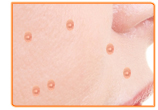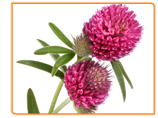Does Red Clover Cure Acne?
 According to the NYU Langone Medical Center, there hasn’t been any well-designed study to determine whether or not red clover is a suitable treatment for acne. However, red clover has traditionally been used to treat skin-related diseases such as psoriasis and eczema and is considered to be a blood purifier.
According to the NYU Langone Medical Center, there hasn’t been any well-designed study to determine whether or not red clover is a suitable treatment for acne. However, red clover has traditionally been used to treat skin-related diseases such as psoriasis and eczema and is considered to be a blood purifier.
Keep reading below to learn more about red clover’s purifying properties and uses.
Red Clover’s Properties
Red clover is a phytoestrogenic herb, meaning that it contains natural compounds - specifically isoflavones - that mimic the properties of estrogen in the female body. When estrogen levels increase, oil production slows. For this reason, red clover may be useful in treating conditions related to hormonal imbalances such as acne.
Red clover may be used to treat the symptoms of menopause (e.g. night sweats and hot flashes), also caused by hormonal imbalances, most notably a decrease in the production of estrogen and progesterone. The herb contains high levels of minerals and vitamins, which can help to naturally bolster the body’s immune system.
 Red clover oils also have mild inflammatory properties which, if used in tincture form, may treat dry skin caused by eczema. According to the University of Maryland Medical Center, red clover is thought to purify the blood by acting as a diuretic and expectorant (clears mucous from the lungs). Continue reading below to learn more about ways you can take red clover.
Red clover oils also have mild inflammatory properties which, if used in tincture form, may treat dry skin caused by eczema. According to the University of Maryland Medical Center, red clover is thought to purify the blood by acting as a diuretic and expectorant (clears mucous from the lungs). Continue reading below to learn more about ways you can take red clover.
Ways to Take Red Clover
Red clover can be taken in a variety of ways to treat skin-related infections. Common forms to treat skin conditions include liquid extracts, ointments or infusions containing 10-15% flower heads.
Red clover as a dried herb, tincture (30% alcohol) or fluid extract may be added to hot water to make tea.
Add it to salads to honey to enhance flavor, but healthcare professionals advise purchasing organic red clover to avoid ingesting pesticides or other hazardous chemicals. It�s also important to note exposure to toxins is known to aggravate acne.
Before using red clover to treat acne or other skin disorders, you should consult your doctor. You should also take some time to learn about the risks and side effects associated with red clover by clicking here.



























